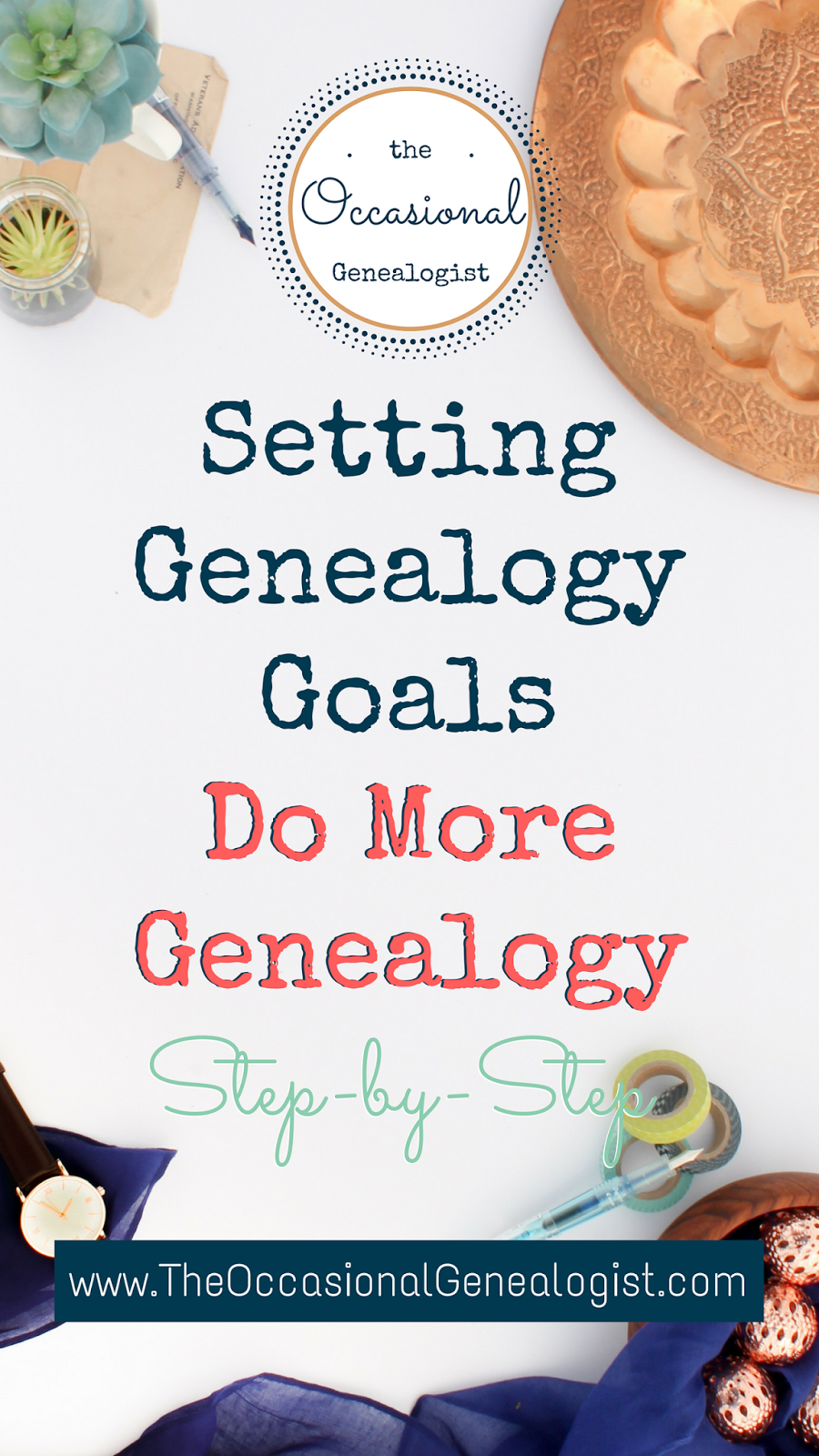As I write this (which is obviously well before you're reading it), there are three weekends until Christmas. Do you think it's time to start planning for the new year?

As an Occasional Genealogist, someone that doesn't have a lot of time for their own family history research, setting genealogy goals for the new year is vital. I've created five steps just for Occasional Genealogists so you can do more genealogy next year.
- Previous year review
- Broad interest or goal identification
- Refining your interests/goals
- Compare and correlate your previous year review (#1) with your refinements (#3)
- Finalizing your resolutions/goals
Deciding what you want to focus on and what kind of time you have available are a must if you want to do more genealogy. This post will cover each step and show you how easy it can be to set achievable genealogy goals or how to adjust when a goal isn't achievable.
[You can get a free printable goal planning worksheet, here.]
Let's get started!
In reality, I started preparing for the new year back in October. It's kinda like decorating for Christmas after Halloween, but without any tinsel.
As a business owner and blogger (and mother to two young children---meaning I still have to make all the Christmas magic for them or with them), I think preparing in October is the only sensible option. Before Thanksgiving, things are already at a break-neck speed.
But I've given you, an Occasional Genealogist, a little more time before I whip out the "time for New Year's Resolutions" advice.
Seriously, if you haven't started thinking about it, you're about to be behind.
Enjoy Making Genealogy Resolutions
Let's slow down for a moment, just in case this pre-Christmas mention of resolutions is making you hyperventilate over one more thing to do.
New Year's Resolutions, or goals for the new year, aren't one more thing to do. They are your chance to get ahead. When we're talking about doing your genealogy (and we are), this is vital and also exciting.
So if planning for the new year seems overwhelming in this busy season, look at it as a chance to slow-down. After all, this is planning, you don't have to rush out and do anything (at least if you do it early you don't have to rush).
Now let's talk about preparing for a new year of genealogy.
Do More Genealogy or Do More Research?
Last year I wrote about making your resolutions or goals and making sure they weren't just "do more research" goals. I'm even more behind that concept this year. (Don't miss the follow-up post which included examples of my genealogy goals).

I can guarantee you one thing, no matter what your resolutions or goals are. Life will happen. That is where I want to start, and we'll make our way towards more traditional resolution-making.
You Don't Have to Make Your Resolutions Today
FYI, I'm laying all of this out in one post, because that makes sense. You probably aren't going to do all this in one sitting. That's the reason I like to start early.
Some of the later steps might take you more time, or you might prefer some "quiet time" when you do them. That usually means you'll need to get started and then set aside some time for whatever aspect you want to focus on. Without starting, you usually don't know what you need (or how much time you need) to finish up your new year planning.
Once again, here are the areas you want to address, in order.
- Previous year review
- Broad interest or goal identification
- Refining your interests/goals
- Correlating your previous year review with your refinements
- Finalizing your resolutions/goals
I'll describe each of these steps, and hopefully, you'll find this is a really simple project to complete.
Your Year in Review
Don't let this very formal sounding step dissuade you from even starting. This is a vital step for Occasional Genealogists and also a step you can make very simple.
A full year in review is a great idea (whether you want to consider your whole year or just the genealogy you did during the year). Personally, I can't manage a full year review. I'd have to start in June to find time to complete it and still have time for the other steps. You can't review your year before it's happened.
Instead, I try to simplify by considering what I tried to accomplish (what my resolutions/goals were, including any I added later) and how things went in general. I want to identify why things went well or failed and if the reasons are going to happen again.
For business, this can be a bit more involved. For personal genealogy, I find so little time, I can pretty much think about why I didn't do more genealogy and how I would have liked things to go differently when I did do genealogy.
The most important aspect is identifying why I couldn't do research when I had free time and what "surprises" affected my calendar. By surprises, I don't just mean unexpected events. I mean anything that had an effect that was different than I expected.
Identify Your Interests
These are the areas you want to set goals for. If you decide to work on your whole-life goals and resolutions for the year, "genealogy" would be an interest (and each of these steps will take longer, but you can use them for general resolution setting).
If you are just setting genealogy goals, this is where you need to think outside the "do more research" box.
I suggest coming up with a minimum of five items for this step. If you can write a list longer than your arm really quickly, that's fine, too. You just want to create at least five areas before you move on to the next step. That's why I said the broad "genealogy" would be an interest for your whole-life goals.
To give you an example of typical resolutions at this broad level, you usually see:
- Exercise more
- Eat healthier
- [Spiritual or personal development like "read more" or "pray regularly"]
- Work fewer hours/spend more time with family
- [Financial goal like "spend less" or "earn more"]
- Do more genealogy
That should give you the idea of how broad these are. None of the above broad goals are really actionable. How are you going to achieve any of these things? Not answering that question at this point is fine, that's the point.
So if we're talking about genealogy only, you don't need to create a research plan for the project you want to work on. You just need to know you want to work on a specific project. It can be a broad specific project (ex. your maternal line, that's better than the too broad "do more genealogy"). It can also be pretty specific, as long as you come up with it quickly.
With these broad interests or broad goals, just capture some ideas quickly. The next step is where you start refining them. If you are short on time (you're an Occasional Genealogist, after all) try and do these first two steps at the same time if you can. You might want to spend more time on your year in review (so maybe break that step up into more than one session) but this second step should be quick and easy.
If you seem to have one and only one genealogy goal, really try and break it into five broad parts. That will probably mean you have a research part, an education part, and an organizing part.
I know that's only three parts, but you might have several broad education goals. Maybe education won't help, maybe you need to find a research specialist. Say your one big goal is working on a German research project and you don't speak German. You probably can't learn to speak German this year (if you can, you should have more time for genealogy!).
For a project where you need to hire a specialist, you'd have:
- a research part,
- a research your options or find a specialist part,
- a budgeting part (to pay for the specialist),
- an organizing part (to keep track of your options or possible specialists AND your budget),
- and maybe education or organizing your research (is your past research ready to go to the specialist?).
[A great place to start to find a specialist in a certain area of genealogy is the Association of Professional Genealogists' Directory. There are multiple ways to find someone to fit the different needs of the client (that's you).]
It is complicated to give a generic example, but it should be simple for you to break your single interest into five parts. I'm encouraging you to do this to avoid focusing only on doing research. You need to plan, research, report (which includes analysis), educate yourself, and organize. You might also need to budget.
Plan, research, report are all "research" related but make sure you are doing all three. If you get nothing else from this post, it should be that doing more genealogy in the new year is about doing more than just research.
Refining your interests/goals
Once you've created a quick list of at least five broad interests, start defining them better. If you begrudgingly added "education" or "organization," be realistic about what you want AND need to do and in what order.
You might want to research a particular ancestor. Do you need to learn about a specific topic, first? Do you need to gather your previous research and review it?
Don't just create a list of "busy work." Almost all of us could say "I need to file these papers." If you're an Occasional Genealogist, you need to focus on your broad goal and what you really need to do to achieve it.
Yes, you may have a pile of papers. Perhaps that should be a goal, but make it a free-standing goal (not related to a specific project) and make it easily achievable.
The reason you have a pile of papers is you are short on time. Will you ever set apart a large enough chunk of time to accomplish all your filing (it depends on the size of your pile)? If you can't do all the filing in one go (or won't give up enough time to do it in one go), make your goal filing what is related to a single project. Maybe just separate the other papers into loosely organized piles as you go.
The above two paragraphs are not contradictory. If you want to set a goal to "file all the papers," it needs to be easy to achieve. If that is not possible, make the goal "file the papers related to [a specific project you will continue after the filing is done.]" These are different refinements of an organizing goal.
You are done with this step when you have a list of goals or resolutions or on December 31st (if you just keep coming up with more ideas).
Correlate your year review with your refinements
Did you see how I used a "genealogy word" for this step? Correlation isn't that hard. Here, you're going to consider how your review of the past year should affect your list of goals.
Basically, it's time to toss the ideas you won't have time for.
This is why it's important to consider the order goals may need to be achieved in. Rather than be extremely general, I'm going to give a slightly more specific "generic" example.
Let's say you want to research a certain person. You've determined you need to learn a topic before starting research.
Do you have to learn the topic before doing anything? Could you review your previous research and write it up in a report first? Maybe you can even gather some possible source ideas for a few repositories you want to visit.
Now comes the correlation. If your year review revealed you only have 15-minute segments of time in January and February, but you can use vacation time (up to two weeks) in June and July, how does that affect the refinements of your goal?
If you HAVE to do the education first, can it be done in those 15-minute segments in January and February? Maybe. What if you need more in-depth education, like an online or in-person course? Can you take that any time of year? Can you get that course in June or July when you have larger amounts of time?
Even if the education doesn't have to be first, if it has to be accomplished in June or July (when you have "large" amounts of time) this can make a difference. A huge difference. If it's not available in June or July, it's not an option this year.
Can you make your goals fit in the time you have? If not, you'll have to either adjust your time (probably not an option) or adjust your goals.
This is a GREAT way to avoid failure. If there is no way your goals will fit in your available time, you will fail. That doesn't make anyone feel good. Adjust so you can succeed.
What To Do When Your Schedule and Your Goals Don't Mix
If the project you really want to work on this year just won't work with your schedule, consider adjusting your expectations.
Maybe you have a vision of how you should do research. Is this really your only option? Could you research in shorter segments of time? Are there other tasks you can do between the times you can research?
Sometimes you only have one option. Sometimes you need certain records, and it takes more time (or money) than you have.
My advice for this situation is one of two options. Plan a research trip or hire a professional.
Choosing Planning Instead of Researching
You can take an actual trip, do a stay-cation style trip, hire someone to get you copies of records, or hire someone to get copies and do the research. The point is you realize you are going to have to set aside a large amount of time and/or money. If that's not possible this year, start planning for the year after.
This year you might not be doing "more research." You might be planning a research trip, having a yard sale (or whatever you can do for some extra cash), or determining your options for hiring someone. All of these are still "doing genealogy."
You should have had some very strong feelings of "I want to work on this" instead of "I know I can't work on this, so I'm interested in ______, instead."
You don't have to set your top interests aside if you can identify the other, non-research, areas you need to work on. Most genealogists keep sidelining a project of high-interest because they are too focused on research.
If your correlation just won't work---your time doesn't fit with your initial goals---you're going to have to focus on education or planning. Adjust your goals to achieve what needs to be done, even if it's not "more research."
Finalizing your resolutions/goals
There's not a lot for me to say about this last step. Finalize a short list of reasonable goals that you can achieve in the time you have available.
It is up to you if you want to actually schedule these goals on a calendar.
I've gone into a lot of hypothetical details about refining your goals and correlating them with your schedule. Some genealogists have very set ideas about what they want to do and how they want to do it. All those details are for them.
If you're a pretty flexible person (and especially if you'd be happy working on any number of different projects), it may take you longer to read this post than actually set realistic goals.
To recap:
- Review your year---you need to know what kind of time you expect to have this year (based on the reality of last year) and you also want to consider what went well or wrong. This doesn't have to be complicated.
- Come up with at least five broad interests or goals. Just do this quickly. That means a long list is OK. Break up your interests if you don't initially have five and make sure you include non-research goals (but they can obviously be related to accomplishing research).
- Refine your broad goals. How will you achieve them? When we're talking about research, we often have to get organized so we can review what we've done. We might need to learn a new topic. Don't forget these other vital parts.
- Correlate your refined goals with your year's review. Can you achieve your goals in the time you should realistically have? Are you setting yourself up to repeat the same bad habits you identified in the past year? Adjust your expectations or your focus (focus on the planning so you can do research next year if it won't fit this year's schedule). If you have to, go back and come up with new goals you can achieve.
- Define your final list of goals. There's no magic number, but I find five is a good number. You still have choices, but that's a little over two months per goal (not that you'll achieve them in equal amounts of time). You want goals you'll complete but that you'll also want to work on. If you're OK tossing out goals as you go (especially to give yourself more options), define more goals.
Be realistic, be happy, and be excited to start working on your genealogy goals!
Want to approach goal setting in a different way or need more examples of how to get specific and achievable goals? Check out Amy Johnson Crow, CG's post on SMART Genealogy Goals.









